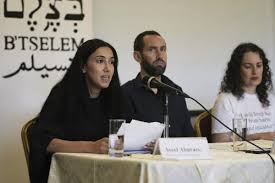Two rights groups are first Israeli voices to accuse Israel of genocide in Gaza

In a rare and powerful act of dissent, two leading Israeli human rights organizations have taken a bold step that has reverberated across the globe. Breaking the Silence and Yesh Din, both known for their critical documentation of Israeli military conduct in the occupied Palestinian territories, have publicly accused the Israeli government of committing genocide in the Gaza Strip. This marks the first time Israeli civil society organizations have used the term ‘genocide’ to describe their government’s actions, a move that has triggered strong reactions domestically and internationally.
A New Tone in Domestic Criticism
While international bodies, including United Nations experts and humanitarian organizations, have long raised concerns about the nature and scale of Israel’s military operations in Gaza, internal criticism from Israeli voices has typically stopped short of such strong legal definitions. By invoking genocide, a term defined under the 1948 UN Convention as acts committed with intent to destroy, in whole or in part, a national, ethnic, racial, or religious group, these two organizations have shifted the conversation from one of questionable military policy to one of potential international criminal responsibility.
In a joint statement, Breaking the Silence and Yesh Din declared:
“After months of monitoring, testimonies, and analysis, it has become undeniable that the Israeli government’s policies and military operations in Gaza meet the legal definition of genocide. We are compelled to speak out, not only as advocates for human rights but as citizens who cannot remain silent in the face of mass atrocities committed in our name.”
Evidence and Allegations
The groups point to a variety of actions that, in their view, support their claim: widespread civilian casualties, intentional destruction of homes and infrastructure, repeated attacks on hospitals, refugee camps, and schools, as well as the forced displacement of the majority of Gaza’s population.
They also reference public statements by high-ranking Israeli officials that, they argue, reveal intent to inflict harm on the Palestinian population. Legal scholars have noted that establishing intent is a critical component in proving genocide under international law, and such rhetoric may serve as potential evidence in any future legal proceedings.
Breaking the Silence, composed mainly of former Israeli soldiers, has a long history of collecting testimonies on military abuses. Yesh Din has spent years documenting human rights violations in the West Bank. Now, their focus has shifted squarely onto Gaza — and their tone is urgent.
National Reactions: Condemnation and Denial
The statement has been met with fierce condemnation from many sectors within Israel. Government ministers called it a betrayal, and nationalist voices accused the organizations of spreading anti-Israel propaganda. Some lawmakers have even suggested initiating legal proceedings against the NGOs for defamation or incitement.
Israeli Prime Minister Benjamin Netanyahu responded indirectly, stating in a press conference:
“Our military is the most moral in the world. We do everything we can to avoid civilian casualties. The real crime is being committed by Hamas, which hides behind civilians and uses them as human shields.”
Despite this response, the statement by the two rights groups has made headlines in international media and added pressure on Israel amid growing scrutiny from international legal bodies, including the International Criminal Court (ICC) and the International Court of Justice (ICJ).
International Implications
The timing of the statement is significant. Earlier this year, South Africa brought a case against Israel before the ICJ, alleging violations of the Genocide Convention. While Israel strongly denies the charges, the inclusion of testimony and findings from Israeli organizations themselves may carry substantial weight in shaping international opinion.
Legal experts argue that domestic acknowledgment of potential war crimes or genocide — especially from groups historically aligned with democratic values and legal accountability — could influence both the court of law and public perception.
Some foreign governments, particularly in the Global South, have already used the term genocide in relation to Gaza. The entry of Israeli voices into that discussion may push more Western governments to reevaluate their stance.
Gaza’s Human Toll
While political and legal debates rage, the human cost continues to mount. According to the Palestinian Ministry of Health, more than 30,000 Palestinians have died since the beginning of the latest war, the majority of them women and children. Over 80% of the Gaza population is now displaced, many living in temporary shelters without access to clean water, food, or medical care.
Hospitals have been targeted, and doctors speak of treating children with no anesthesia due to medical shortages. Humanitarian aid is trickling in, but not fast enough to meet urgent needs.
The Israeli government insists it is targeting Hamas militants and infrastructure, but the scale of destruction and the large number of civilian deaths have raised questions in many international capitals.
A Turning Point or a Lone Voice?
Whether this moment marks a true turning point in Israeli public discourse is unclear. Breaking the Silence and Yesh Din remain relatively small voices in a country where public opinion largely supports the military campaign. However, their courage to speak out — especially during wartime — could inspire other individuals, organizations, or whistleblowers to follow.
Both groups have said they expect backlash, funding losses, and personal attacks — but insist that the truth and accountability are worth the cost.
“We are not the enemy of Israel,” one Yesh Din spokesperson said. “We are fighting for the soul of this country — for a future where justice matters more than power.”






